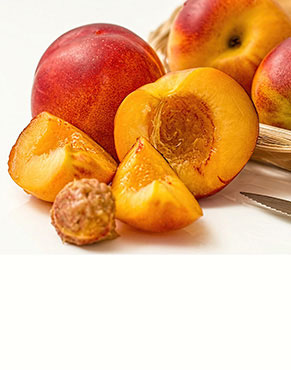How This Helps
Peach Health Benefits and Useful in:
Hypokalemia | Cancer | Obesity | High cholesterol | Neurodegenerative diseases | Eyes | Healthy bones | Detoxification | Digestive health | Boosts immunity | High Blood pressure
Instructions
Nutrition Facts for Peach:
Serving size: 100 g
Nutrients Amount
Energy 165 kJ (39 kcal)
Water 88.87 g
Carbohydrates 9.54 g
Sugars 8.39 g
Dietary fiber 1.5 g
Fat 0.25 g
Protein 0.91 g
Vitamins
Vitamin A equiv. 16 μg
beta-carotene 162 μg
Thiamine (B1) 0.024 mg
Riboflavin (B2) 0.031 mg
Niacin (B3) 0.806 mg
Pantothenic acid (B5) 0.153 mg
Vitamin B6 0.025 mg
Folate (B9) 4 μg
Choline 6.1 mg
Vitamin C 6.6 mg
Vitamin E 0.73 mg
Vitamin K 2.6 μg
Minerals
Calcium 6 mg
Iron 0.25 mg
Magnesium 9 mg
Manganese 0.061 mg
Phosphorus 20 mg
Potassium 190 mg
Sodium 0 mg
Zinc 0.17 mg
Source: USDA Nutrient Database
Science and Research
Health Benefits of Peach:
Hypokalemia:
A lack of potassium in the body leads to hypokalemia. This condition affects the muscular strength of the body and results in irregular heartbeat, which can cause strokes. The peach fruit contains high levels of potassium, which helps in maintaining your blood pressure, helps in utilizing carbohydrates, maintains the electrolyte balance in the body and also leads to healthy bones and joints.
Cancer:
Peaches are rich in many phenolic and carotenoid compounds which act as antitumor compounds. In fact, this fruit is rich in the antioxidants like chlorogenic and neochlorogenic acid which shows remarkable activity against breast cancer. Unlike the chemotherapy treatment, which affects even the healthy cells, these compounds affect only the cancerous cells.
Eyes:
Peaches are rich in beta-carotene, which is converted to Vitamin A in the body. This compounds plays a vital role in maintaining the health of the eyes and prevents diseases like xerophthalmia along with blindness. Moreover, the carotenoids, like lutein and zeaxanthin in the fruit, reduce the cataract formation and prevent macular degeneration of the retina. They also protect the retina from cellular damage caused by the high-light or free radicals.







